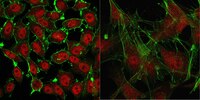ABT1485 Sigma-AldrichAnti-Actin
This rabbit polyclonal Anti-Actin Antibody, Cat. No. ABT1485 is validated for use in Immunocytochemistry, Immunohistochemistry (Paraffin), and Western Blotting for the detection of Actin.
More>> This rabbit polyclonal Anti-Actin Antibody, Cat. No. ABT1485 is validated for use in Immunocytochemistry, Immunohistochemistry (Paraffin), and Western Blotting for the detection of Actin. Less<<Recommended Products
Overview
| Replacement Information |
|---|
Key Specifications Table
| Species Reactivity | Key Applications | Host | Format | Antibody Type |
|---|---|---|---|---|
| H, M | ICC, IH(P), WB | Rb | Affinity Purified | Polyclonal Antibody |
| References |
|---|
| Product Information | |
|---|---|
| Format | Affinity Purified |
| Presentation | Purified rabbit polyclonal antibody in buffer containing 0.1 M Tris-Glycine (pH 7.4), 150 mM NaCl with 0.05% sodium azide. |
| Quality Level | MQ100 |
| Physicochemical Information |
|---|
| Dimensions |
|---|
| Materials Information |
|---|
| Toxicological Information |
|---|
| Safety Information according to GHS |
|---|
| Safety Information |
|---|
| Storage and Shipping Information | |
|---|---|
| Storage Conditions | Stable for 1 year at 2-8°C from date of receipt. |
| Packaging Information | |
|---|---|
| Material Size | 100 µL |
| Transport Information |
|---|
| Supplemental Information |
|---|
| Specifications |
|---|
| Global Trade Item Number | |
|---|---|
| Catalog Number | GTIN |
| ABT1485 | 04054839055515 |
Documentation
Anti-Actin SDS
| Title |
|---|
Anti-Actin Certificates of Analysis
| Title | Lot Number |
|---|---|
| Anti-Actin - 3856661 | 3856661 |
| Anti-Actin - 4040792 | 4040792 |
| Anti-Actin -Q2737510 | Q2737510 |
| Anti-Actin Polyclonal Antibody | 3142380 |














